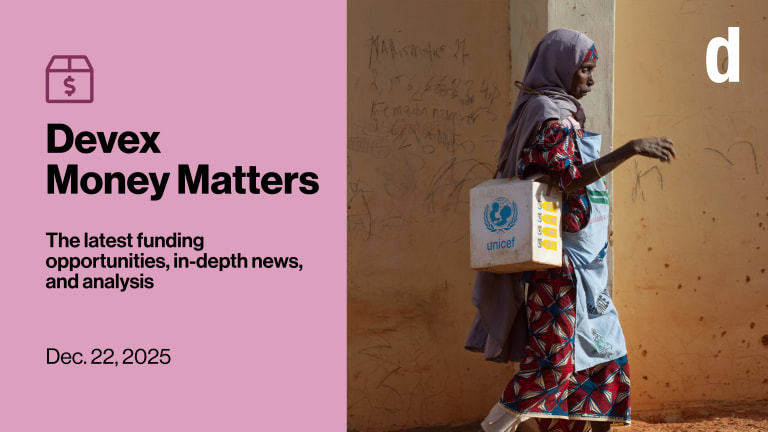
NEW YORK — The COVID-19 pandemic is pushing many philanthropic foundations to give more money more quickly, with fewer strings attached to support responses, according to Kathleen Enright, CEO at the nonprofit Council on Foundations.
The sudden increase in funding for COVID-19 could become a more routine part of foundations’ standard giving portfolios. But it will take some time for the funding data on giving to catch up with anecdotal evidence.
Interactive: Who's funding the COVID-19 response and what are the priorities?
As funding activities in support of the COVID-19 response transition from words into action, our analysis of funding data is transitioning with it. Here's the latest.
“My gut says funding absolutely has increased, but I don't have the data to back it up, yet. There are absolutely new donors coming to the table,” Enright told Devex. “They're releasing restrictions on previous grants. They're topping up particular grantees.”
“Philanthropy is not always known for the speed of its work, but with COVID-19, many big pieces of work have evolved really quickly and there are examples of that from Gates and Ford Foundation and Rockefeller Foundation and other big global grant-makers,” Enright continued.
The Bill & Melinda Gates Foundation has given more than $250 million to COVID-19 therapeutics, diagnostics, and leading vaccine work, and has also freed up previously allocated funding for implementers, according to Robert Rosen, director of philanthropic partnerships.
The Rockefeller Foundation has laid out a national testing plan in the U.S. and committed $30 million for its response work, while Bloomberg Philanthropies has given more than $8 million to the World Health Organization and $10 million to the International Rescue Committee. It is also leading on a new contact-tracing program to control the spread of the virus in the United States.
“In the COVID-19 situation, countries are really keen to do a lot more on mortality so they can understand what the burden of the COVID-19 pandemic is. We've pivoted the support in those localities to help countries think through what it is they need to do now on the coding side and all these various other aspects,” said Kelly Henning, who heads Bloomberg Philanthropies’ public health program.
“This is not an endeavor where everything should be a smashing success, because then you're probably not aiming high enough.
— Robert Rosen, director of philanthropic partnerships, Gates FoundationThe scale and scope of new philanthropic giving has also elevated the public profile of some foundations, whether they work closely alongside governments in critical day-to-day health work, or track COVID-19 case projections. But philanthropy cannot entirely fill a public health gap that many governments have struggled to fill, Enright explained.
“Particularly the foundations that have a focus on eradicating diseases, they have incredible expertise to bring to bear. Philanthropy cannot, should not be any sort of replacement value for the government,” Enright said. “Philanthropy fundamentally exists to support the greater good, as does the government in most respects, but philanthropic funds are entirely dwarfed by government resources.”
The idea is to take necessary risks that governments might not be able to, and private sector companies may shy away from, Gates’ Rosen explained.
“This is not an endeavor where everything should be a smashing success, because then you're probably not aiming high enough. More than anything, I think it's important that donors play that role in terms of being able to move quickly into areas where there are gaps and needs, and where fast-moving money can really drive the change that we want to lead to positive results,” Rosen said.
Bloomberg Philanthropies’ COVID-19 work, meanwhile, marks a seemingly clear pivot from its non-communicable diseases, road safety, and public health data programs. But there are connections between Bloomberg’s standard portfolio and these emerging areas of need, according to Henning.
“Interestingly, as this COVID-19 pandemic has emerged we've discovered that many of those non-communicable diseases, chronic lung disease, heart disease, diabetes, are risk factors for COVID,” Henning explained. “So there is some interconnectedness to the work we've been doing and this work that we're doing now. We see them as sort of a continuum of support on the public health side.”
‘It was the right thing to do now’
The health and socioeconomic crisis is also drawing in non-health-focused foundations, like the Conrad N. Hilton Foundation.
Hilton Foundation CEO Peter Laugharn said the Los Angeles-based organization has not revised its five-year strategy to be entirely COVID-centric, but it has given $5 million to the World Health Organization, UNICEF, and public health response work in sub-Saharan Africa. It has also allocated more than $10 million to other areas of COVID-19 work in the U.S. and internationally.
“While we don't usually fund at that level and we’ve never funded WHO, it was the right thing to do now,” Laugharn said.
“We're not a public-health-oriented foundation, primarily. We have some programs that are public health adjacent,” Laugharn continued. “And yet, I think we recognize that this is a role that foundations are all called on to play right now.”
The necessary funding response from foundations is unlikely to be a short-term situation. Enright explained that many foundations are adopting a long-term vision.
“I think a lot of foundations are recognizing the fact that this is going to be a very long road to any kind of recovery. I am personally aware of several major U.S.-based international foundations that are going to their boards to talk about expanding giving,” Enright said. “It maybe hasn't happened yet because they were building a plan, but they want to be part of the longer tail of the recovery.”
Rosen and several other foundation leaders spoke of the need for a continued response and consideration of COVID-19, even as other core development work gradually receives more renewed attention. Rosen and Henning both said that even after the worst of the crisis passes, COVID recovery and prevention is likely to continue being incorporated into different areas of their foundation’s work.
The crisis could also offer an opportunity for change in the philanthropic sector, Rosen explained.
“One of the positive outcomes that can come out of a devastating situation like this is that philanthropy, as well as other sectors really do evolve. And somehow, you know, in the long run, become better because of this,” Rosen said.








